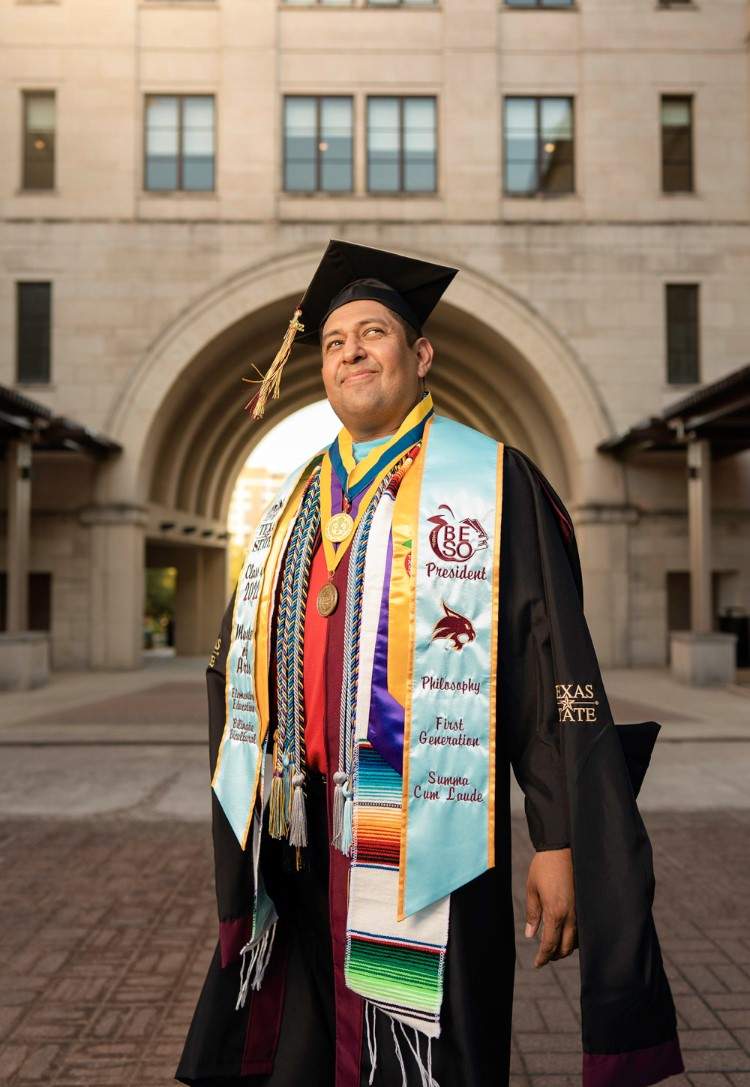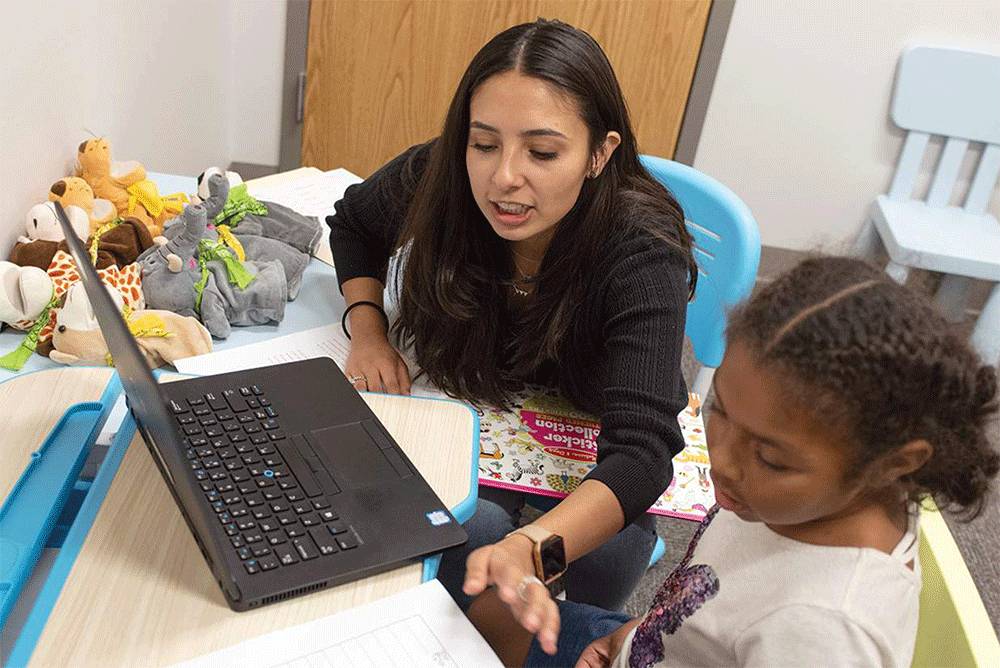Students gain historical, political, linguistic and pedagogical foundations to deliver educational experiences to bilingual and emergent bilingual students.
Elementary Education Bilingual/Bicultural

Program Overview
Texas State University is a Hispanic-Serving Institution located in the heart of Texas, which is rich in bilingual communities. The campus is situated in close proximity to public schools with diverse, bilingual education programs where students can get hands-on experiences teaching and learning in bilingual classrooms.
Course Work
Certified teachers who enter the graduate elementary education - bilingual/bicultural degree programs can earn either a master of education (M.Ed.) or a master of arts (M.A.) in elementary education - bilingual/bicultural.
The 30-credit-hour M.A. degree program requires students to complete course work in bilingual/bicultural elementary education, a minor and a written thesis.
The 36-credit-hour M.Ed. degree program requires course work in elementary education and an approved minor. This degree program requires a comprehensive exit exam.
| Degree | Hours | Thesis Option | Minor Option | Location |
|---|---|---|---|---|
Degree M.A. | Hours 30 | Thesis Option Thesis | Minor Option Minor required | Location San Marcos |
Degree M.Ed. | Hours 36 | Thesis Option Non-Thesis | Minor Option Minor required | Location San Marcos |
This program is for students seeking only a master's degree. If you wish to pursue a master's degree and certification, please review the details for the M.Ed. in elementary education + EC–6 core subjects bilingual certification program.
Program Details
Students are master teachers, and pre-service teachers committed to advocating for emerging bilingual students and transforming inequitable school practices and policies. Graduates who write an M.A. thesis are well prepared to pursue doctoral studies.
Program Mission
The mission of the bilingual/bicultural program is to prepare educators to advance students' bilingualism in Spanish and English through the affirmation of their existing cognitive, cultural and linguistic resources in academically rigorous bilingual education programs. The bilingual/bicultural program is committed to providing educators with innovative pedagogical practices, research opportunities, professional development, and networking and outreach. Professionals who graduate with a master's degree will apply research-based methodology based on critical and culturally relevant pedagogy that aims to transform the sociopolitical contexts of schooling in an effort to ensure equitable educational opportunities for emergent bilingual students.
Career Options
The master's program in elementary education - bilingual/bicultural is designed for bilingual and biliterate (Spanish and English) individuals who want to teach emergent bilingual children in prekindergarten through sixth grade. Graduates can also use their degree as a pathway to doctoral programs and administrative, counseling and higher education positions.
Program Faculty
Faculty are involved in research projects that center on teacher preparation through educational equity, race and language, biliteracy development, bilingual math education, teaching young bilinguals and the recruitment and retention of bilingual and ESL teachers. Faculty have published in top-tier journals, including International Journal of Bilingual Education and Bilingualism, Journal of Latinos and Education, Bilingual Research Journal, Educational Studies in Mathematics, Journal for Research in Mathematics, Journal of Anthropology and Education, Reading Research Quarterly, Language Arts, International Journal of Qualitative Studies in Education, International Multilingual Research Journal, Language Assessment Quarterly, The International Journal of Learning, Harvard Educational Review, and Teachers College Record.
Contact us for general questions about your application, funding opportunities, and more. If you have specific questions after reviewing the program details, contact the program's graduate advisor.

Already know that Texas State is right for you?
Application Deadlines
-
For Entry Prior to Summer 2026
DEADLINES U.S. CITIZEN INTERNATIONAL Fall - Priority February 1 February 1 Fall - Standard June 15 (*Flexible) June 1 Spring October 15 (*Flexible) October 1 Summer I April 15 (*Flexible) March 15 Summer II June 1 (*Flexible) No Admission *This program’s deadline is flexible for those not requiring an F/J visa. A flexible deadline means applications received after the standard deadline may be reviewed on a first-come, first-served basis with no guarantees for admission consideration.
-
Effective for Summer 2026 Entry and Beyond
DEADLINES U.S. CITIZEN INTERNATIONAL Fall - Priority February 1 February 1 Fall - Standard August 1 June 1 Spring - Priority September 1 September 1 Spring - Standard November 1 October 1 Summer I - Priority January 1 January 1 Summer I - Standard May 1 March 15 Summer II - Priority January 1 No Admission Summer II - Standard June 1 No Admission
For important information regarding deadlines and decision timelines, review the Application Policy Information page.
Admission Requirements
The items required for admission consideration are listed below. Additional information for applicants with international credentials can be found on our international webpages.
-
Application
- completed online application
Review important information about the online application.
-
Application Fee
- $55 nonrefundable application fee, OR
- $90 nonrefundable application fee for applications with international credentials
Review important information about application fees.
-
Transcripts & GPA
- Baccalaureate degree from a regionally accredited university. (Non-U.S. degrees must be equivalent to a four-year U.S. Bachelor’s degree. In most cases, three-year degrees are not considered. Visit our International FAQs for more information.)
- A copy of an official transcript from each institution where course credit was granted.
- A 2.75 overall GPA or a 2.75 GPA in your last 60 hours of undergraduate course work (plus any completed graduate courses).
Review important information about transcripts. Official transcripts, sent directly from your institution, will be required if admission is granted.
-
Test Scores
GRE
- GRE not required
Approved English Proficiency Exam Scores
Applicants are required to submit an approved English proficiency exam score that meets the minimum program requirements below unless they have earned a bachelor’s degree or higher from a regionally accredited U.S. institution or the equivalent from a country on our exempt countries list.
- official TOEFL iBT scores required with a 78 overall
- official PTE scores required with a 52 overall
- official IELTS (academic) scores required with a 6.5 overall and minimum individual module scores of 6.0
- official Duolingo Scores required with a 110 overall
- official TOEFL Essentials scores required with an 8.5 overall
This program does not offer admission if the scores above are not met.
Review important information about official test scores.
-
Documents & Other Requirements
- interview with the bilingual coordinator to ensure your proficiency in written and spoken Spanish
- statement of purpose (one page) describing why you wish to teach
- three letters of recommendation
Review important information about documents.